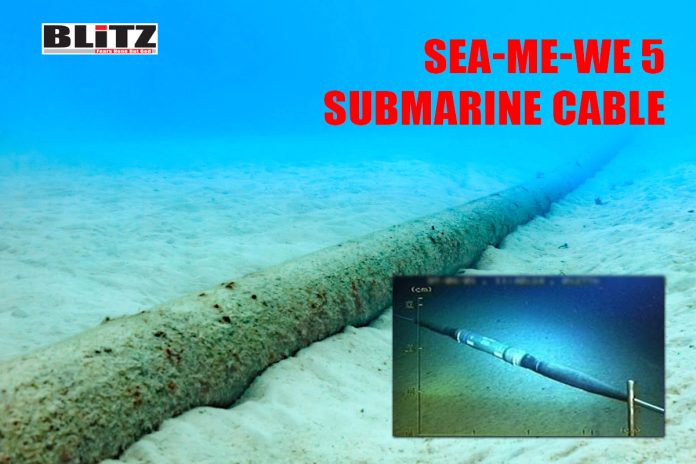Internet users in Bangladesh are currently experiencing disruptions following a breakdown in the SEA-ME-WE 5 submarine cable, the largest supplier of international bandwidth to the country. The incident occurred last night and is expected to take at least 2 to 3 days to restore, as announced by Mirza Kamal Ahmed, the managing director of Bangladesh Submarine Cables PLC (BSCPLC).
The disconnection was identified at midnight, affecting international bandwidth usage in Bangladesh, which currently stands at around 5,200GBPS. Of this, more than half, approximately 2,700 Gbps, is sourced through international terrestrial cable (ITC) license holders importing bandwidth from India. The SEA-ME-WE 5 submarine cable, installed in Kuakata, contributes 1,700GBPS to the total bandwidth.
The specific point of failure for the SEA-ME-WE 5 cable is located between Singapore and Malaysia, causing all circuits of the consortium members to go offline. “A ship will be mobilized to repair and restore the service. The total operation will take a minimum of 2 to 3 days,” Ahmed stated.
The SEA-ME-WE 5 stands as a crucial 20,000km submarine cable network linking 17 countries via Points-of-Presence from Singapore through the Middle East, extending to France and Italy in Western Europe. The cable’s breakage occurred on its eastern segment connecting Singapore, whereas the western connection to France remains unaffected and operational. Consequently, Bangladesh will receive a reduced bandwidth of only 100 Gbps out of the cable’s total capacity of 1,700 Gbps, highlighting the impact of the disruption on the country’s internet connectivity.
In response to the disruption, BSCPLC is actively seeking alternative solutions to maintain connectivity. One approach being considered is to restore the circuits of SEA-ME-WE 5 using SEA-ME-WE 4, Bangladesh’s first submarine cable installed in Cox’s Bazar. This cable, established in 2006, currently supplies around 850 Gbps of bandwidth and has recently been upgraded to a capacity of 3,800 Gbps.
Moreover, the BSCPLC has plans to enhance Bangladesh’s connectivity further with the introduction of a third undersea cable, SEA-ME-WE 6, expected to provide 13,200 Gbps by 2025.
Md Emdadul Hoque, president of the Internet Service Providers Association of Bangladesh (ISPAB), expressed concerns over the impact of the submarine cable’s breakdown on internet services. Mr. Hoque stated that the disruption is likely to severely affect internet connectivity for almost a week, impacting businesses, education, and daily online activities.
Submarine cables play a pivotal role in global internet infrastructure, facilitating high-capacity data transfer between continents. They are essential for supporting global communication, online services, and international connectivity that are fundamental to modern digital operations.
Bangladesh’s dependence on submarine cables for its internet access highlights the vital role these infrastructures play in the country’s connectivity. The recent disruption of the SEA-ME-WE 5 cable emphasizes the vulnerabilities that come with such systems. This incident underscores the imperative for maintaining and upgrading these cables and developing robust contingency plans. Ensuring uninterrupted internet services is crucial for the country’s economy, education, and daily life, making resilience and diversification of internet connectivity sources essential for Bangladesh’s digital future.
The recent cable breakdown underscores the pressing requirement for Bangladesh to diversify its internet connectivity sources and embrace alternative technologies. Strengthening resilience with multiple cable systems, satellite links, and terrestrial networks is pivotal to reducing the impact of future disruptions. Such measures are essential for ensuring uninterrupted internet access for the nation’s expanding population, safeguarding against potential challenges and supporting continued digital development.
As work progresses to repair the SEA-ME-WE 5 cable and sustain internet access through alternative methods, this incident highlights the crucial need for Bangladesh to build a resilient and diversified internet infrastructure. With the nation’s digital landscape rapidly growing, prioritizing investments in strong and backup connectivity solutions becomes essential. These steps are not only crucial for bolstering the digital economy but also for adapting to the changing demands of the population. Ensuring a reliable and varied internet network is key to Bangladesh’s continued digital advancement and success.




